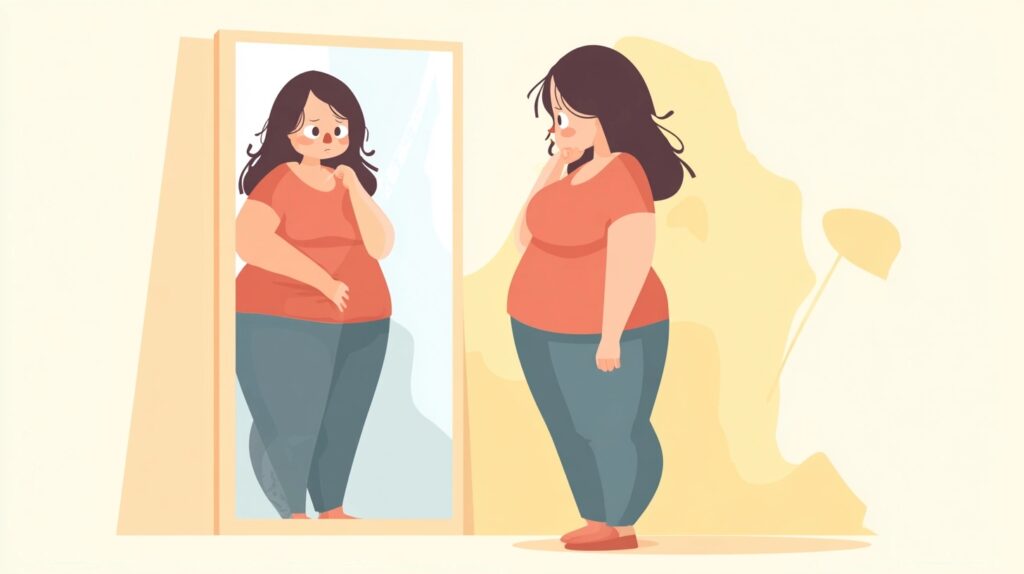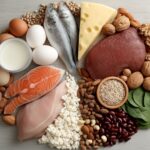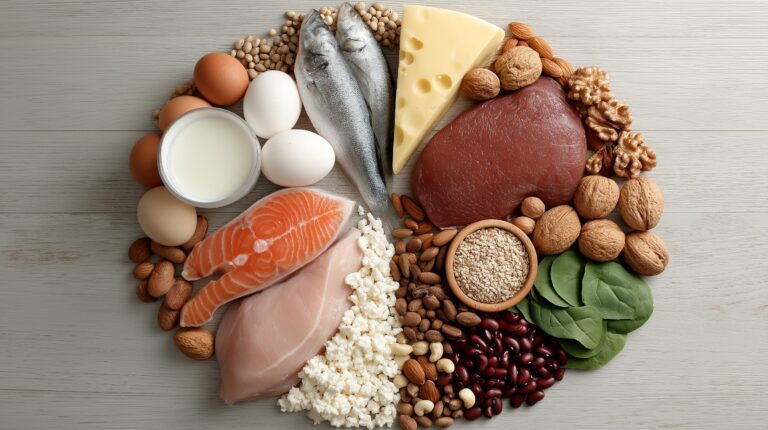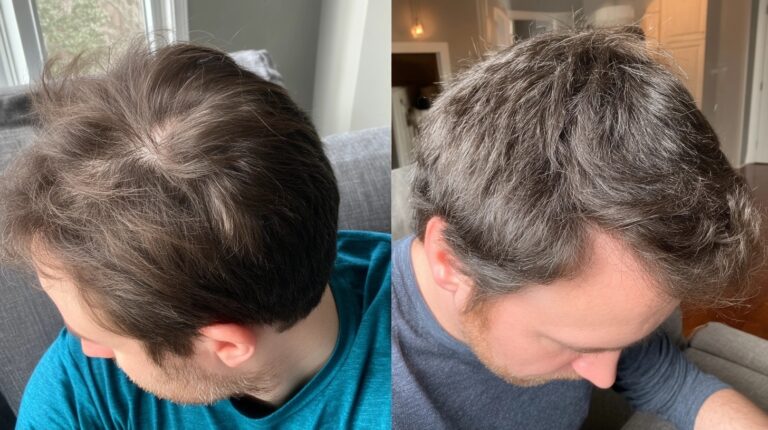Polycystic Ovary Syndrome (PCOS) is a common hormonal disorder affecting an estimated 8 to 13% of women of reproductive age. It may lead to a range of symptoms, including irregular periods, excess hair growth, acne, and difficulty getting pregnant.1
One of the most frustrating aspects of PCOS symptoms for many women is its link to weight gain, particularly around the midsection, often referred to as the “PCOS belly.”
This comprehensive guide will delve into the connection between PCOS and weight gain, explore the science behind it, and provide practical strategies for managing your weight and overall well-being.
What is PCOS and How Does it Affect Your Weight?
PCOS is a condition that stems from an imbalance of reproductive hormones. This imbalance might lead to irregular or absent ovulation, the development of cysts on the ovaries, and an increase in androgens (male hormones).
These hormonal shifts may contribute to various PCOS signs, with weight gain being a significant concern for many women. Additionally, PCOS can lead to energy crashes after meals, sugar cravings, mood swings, poor sleep, low motivation, and reduced body confidence.
Key hormonal factors influencing weight gain in PCOS
Hormonal factors influencing weight gain in PCOS may primarily involve hormonal imbalances, especially insulin and androgens.2 Here’s how:
1- Insulin Resistance and Weight Gain
Insulin is a hormone that helps your body use sugar (glucose) for energy. In PCOS, many women develop insulin resistance, meaning their cells don’t respond properly to insulin. This forces the body to produce more insulin, which might lead to:
- Increased fat storage: Excess insulin promotes fat storage, especially around the abdomen.
- Increased appetite: High insulin levels can make you feel hungry even when your body has enough energy.
- Sugar cravings: Insulin resistance can cause intense cravings for sugary foods, further contributing to weight gain.
2- Androgens and Weight Gain
Beyond insulin, other hormonal imbalances in PCOS contribute to weight gain. Androgens (male hormones) are often elevated in women with PCOS. These hormones may:
- Increase appetite: Leading to increased calorie intake.
- Promote abdominal fat distribution: Giving the characteristic “PCOS belly” appearance. It appears distinct from other forms of weight gain, as individuals living with PCOS often note having a larger abdomen, while the rest of their body stays the same size as usual.
The Science Behind Weight Gain and the ‘PCOS Belly’
The “PCOS belly” is characterised by an increase in visceral or abdominal fat (also known as belly fat), which is the fat stored deep within the abdomen around vital organs.2 According to studies, this type of fat is associated with a higher risk of health problems like heart disease and type 2 diabetes.3
Several factors may contribute to the accumulation of abdominal fat in PCOS:(2,3,4)
- Insulin Resistance: As mentioned earlier, insulin resistance plays a crucial role. Excess insulin promotes fat storage in the abdominal region.
- Hormonal Imbalance: The interplay of elevated androgens, insulin, and other hormones contributes to the characteristic PCOS weight gain pattern.
- Inflammatory Response: PCOS is often associated with chronic low-grade inflammation, which can further contribute to insulin resistance and weight gain.
For personalised advice on managing PCOS, consider discussing your options with a qualified healthcare professional. Consult with your qualified doctor or nurse practitioner in Australia today.
Effective Strategies for Managing Weight with PCOS Belly
Studies indicate that losing as little as 5% of body weight might enhance insulin resistance, hormone balance, menstrual regularity, fertility, and overall quality of life for individuals with PCOS.2 While weight management with PCOS belly can be challenging, it’s definitely achievable with a multi-faceted approach. Here are some holistic strategies that may be effective:
Dietary Tips for PCOS Belly:
- Focus on whole, unprocessed foods: Include plenty of fruits, vegetables, lean protein, and whole grains in your diet.
- Limit refined carbohydrates and sugary drinks: These might spike blood sugar levels and worsen insulin resistance.
- Choose healthy fats: Incorporate sources like avocados, nuts, seeds, and olive oil.
- Consider a low-GI, high protein diet: This may help to regulate blood sugar levels and might be beneficial for women with PCOS.
- Manage portion sizes: Be mindful of how much you’re eating, even with healthy foods.
Exercise Routines for Managing Weight Gain:
- Combine cardio and strength training: Aim for at least 150 minutes of moderate-intensity aerobic activity or 75 minutes of vigorous-intensity aerobic activity per week, along with strength training exercises two to three times a week.
- Find activities you enjoy: This will make it easier to stick to an exercise routine.
- Stay active throughout the day: Incorporate movement into your daily life by taking the stairs, walking or cycling instead of driving, and standing up regularly.
Lifestyle Changes for PCOS Belly Management:
- Prioritise sleep: Aim for 7-9 hours of quality sleep per night.
- Manage stress: Practise relaxation techniques like yoga, meditation, or deep breathing.
- Quit smoking: Smoking may worsen insulin resistance and other PCOS symptoms.
Tracking your cycle: understand your cycle and symptoms to understand personal patterns and tailor lifestyle changes. Apps like Ahlya can help.
Coping with the Emotional Side of PCOS Weight Gain:
- Mental Health Support for Women with PCOS Belly: Connect with support groups or online communities where you can share experiences and find encouragement.
- Body Positivity Tips: Challenge negative thoughts and cultivate self-acceptance. Focus on your overall health and well-being rather than just your weight.
- Stress Management Techniques: Practice mindfulness, meditation, or other relaxation techniques to manage stress and emotional eating.
Without addressing hormonal drivers like insulin resistance, weight loss is more difficult and often not sustainable.
Wrapping It Up!
Managing weight with PCOS can be more effective with a holistic approach that encompasses diet, exercise, lifestyle changes, and mental health support. Remember that you’re not alone in this journey. By taking proactive steps and seeking professional guidance when needed, you can achieve your health goals and live a fulfilling life with PCOS – Start here!
FAQs on Weight Gain and PCOS Belly
What causes weight gain in PCOS?5
PCOS may lead to weight gain due to hormonal imbalances, particularly insulin resistance, which is common among those with the condition. This makes it harder for your body to use insulin effectively, leading to increased fat storage.
Why is losing belly fat so difficult with PCOS?2
The “PCOS belly” is a term many use to describe stubborn abdominal fat associated with the syndrome. This challenge arises from hormonal fluctuations that encourage fat accumulation around the midsection. However, targeted lifestyle changes and medical support can make a significant difference.
Can diet help manage PCOS-related weight gain?
A balanced diet rich in whole foods—think plenty of fruits, vegetables, lean proteins, and whole grains—can be effective in helping to manage insulin levels and support overall health. It’s often beneficial to work with a nutritionist familiar with PCOS for tailored advice.
Is exercise effective for managing symptoms?
Regular physical activity plays an essential role in managing both weight and symptoms related to PCOS. Incorporating both cardiovascular exercises and strength training into your routine might improve insulin sensitivity and aid in maintaining a healthy weight.
Remember that each person’s experience with PCOS is unique. It’s important to consult with your Aussie-based healthcare provider, as you navigate these challenges.
References
- World Health Organization. Polycystic ovary syndrome. World Health Organization. Published 2023. https://www.who.int/news-room/fact-sheets/detail/polycystic-ovary-syndrome
- Barber TM, Hanson P, Weickert MO, Franks S. Obesity and Polycystic Ovary Syndrome: Implications for Pathogenesis and Novel Management Strategies. Clinical Medicine Insights: Reproductive Health. 2019;13(13):117955811987404. doi:https://doi.org/10.1177/1179558119874042
- Aggarwal M, Chakole S. Prevalence of Polycystic Ovarian Syndrome and Its Link to Obesity in Adolescent Girls. Cureus. Published online September 17, 2023. doi:https://doi.org/10.7759/cureus.45405
- Office on Women’s Health. Polycystic Ovary Syndrome. womenshealth.gov. Published February 22, 2021. https://www.womenshealth.gov/a-z-topics/polycystic-ovary-syndrome
- Hazlehurst JM, Singh P, Bhogal G, Broughton S, Tahrani AA. How to manage weight loss in women with obesity and PCOS seeking fertility? Clinical Endocrinology. 2022;97(2). doi:https://doi.org/10.1111/cen.14726
Contributing Author: Lynda Wilkes-Green
Founder of Ahlya a cycle-syncing wellness app powered by generative AI. Ahlya helps women improve their mental and physical wellbeing by aligning daily habits with their hormonal cycles.









